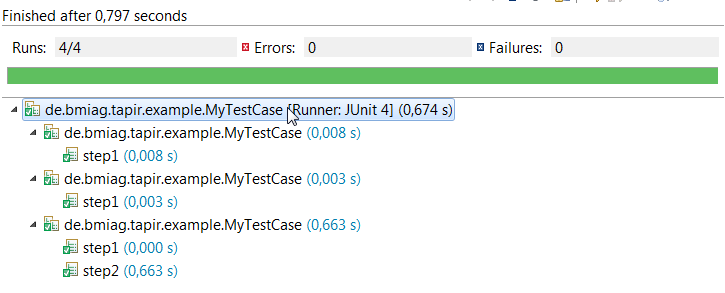-
Changes in Version 3.6.2 (2021-01-22)
Changes in Version 3.5.0 (2020-06-04)
Changes in Version 3.4.2 (2020-03-26)
Changes in Version 3.3.1 (2019-08-22)
Changes in Version 3.3.0 (2019-01-09)
Changes in Version 3.2.1 (2018-12-21)
Changes in Version 3.2.0 (2018-08-27)
Changes in Version 3.1.1 (2018-06-29)
Changes in Version 3.1.0 (2018-03-27)
Changes in Version 3.0.0 (2018-02-20)
Conditional
You might find yourself in situations where you want to execute test steps, cases or suites depending on complex conditions (for instance, the annotations of tapir’svariant module cannot describe your condition). Of course you could simply use a plain if-statement. But the test case would still be visible in the test report, although you don’t want it to be executed. For such situations, tapir provides the conditional module.
Dependency
<dependency>
<groupId>de.bmiag.tapir</groupId>
<artifactId>tapir-conditional</artifactId>
</dependency>
The module gives you the Conditional annotation. This annotation can be used on test steps, test cases and test suites. The usage of this annotationforces you to implement a method with a boolean return type which determines whether the annotated element will be executed or not. The naming convention of the method is similar as for the Parameter and IteratedParameter annotations in the data provider chapter. There are three possibilities.
Unparameterized
If you don’t parameterize the annotation, the conditional method is derived from the test step or the test class and must be provided by the test class. Annotated steps get a method with the name of the step and the suffix Condition. Annotated test classes get a method with the name of the test class and the suffix Condition.
MyTestCase.xtend
@TestClass
@Conditional
class MyTestCase {
@Step
@Conditional
def void step1() {
}
override step1Condition() {
...
}
override myTestCaseCondition() {
...
}
}
Value or method
The name of the conditional method can be specified with the attributes of the annotation value or method (which is just an alias for value). This allows also to use the same conditional method for different classes and steps.
MyTestCase.xtend
@TestClass
@Conditional(method="myCondition")
class MyTestCase {
@Step
@Conditional("myCondition")
def void step1() {
}
override myCondition() {
...
}
}
conditionalClass
Simmilar to the data provider classes, you can specify conditional classes which handle the conditions for your test cases. This allows also to reuse the same conditions through multiple tests. You can use the attribute conditionalClass of the Conditional annotation to specify another conditional class. If you use such external conditional classes, they must be available in the spring context. It is usually sufficient, if they are annotated with the Component annotation from Spring.
MyConditional.xtend
@Component
class MyConditional {
def boolean myCondition() {
...
}
}
MyTestCase.xtend
@TestClass
class MyTestCase {
@Step
@Conditional(conditionalClass=MyConditional, method="myCondition")
def void step1() {
}
}
Examples
Let us take a look at some examples. The following test case consists of two steps. The field param is annotated with IteratedParameter. As the method paramParameter returns three elements, the whole test case will be executed thrice. However, step2 is annotated with Conditional. In this case, the condition says, that step2 will only be executed, if param is greater than two. This will only be the case in the third pass of the test case.
MyTestCase.xtend
@TestClass
class MyTestCase {
@IteratedParameter
private int param
@Step
def void step1() {
}
@Step
@Conditional
def void step2() {
}
override paramParameter() {
#[1, 2, 3]
}
override step2Condition() {
param > 2
}
}
The following image shows the execution in the Eclipse IDE. Note that MyTestCase is indeed executed thrice, but that step2 cannot be seen in the first two passes. The condition avoids that step2 will be seen in the report in the first place.

Now let us assume that you have three features in your application: Feature1, Feature2 and Feature3. Now you want to execute your test step if and only if Feature1 and Feature2 are active or Feature1 is not active but Feature3 is active. With the help of the Conditional annotation you can now implement this condition.
MyTestCase.xtend
@TestClass
class MyTestCase {
@Autowired
extension FeatureCheckService
@Step
def void step1() {
}
@Step
@Conditional
def void step2() {
}
override step2Condition() {
(Feature1.active && Feature2.active) || (!Feature1.active && Feature3.active)
}
}